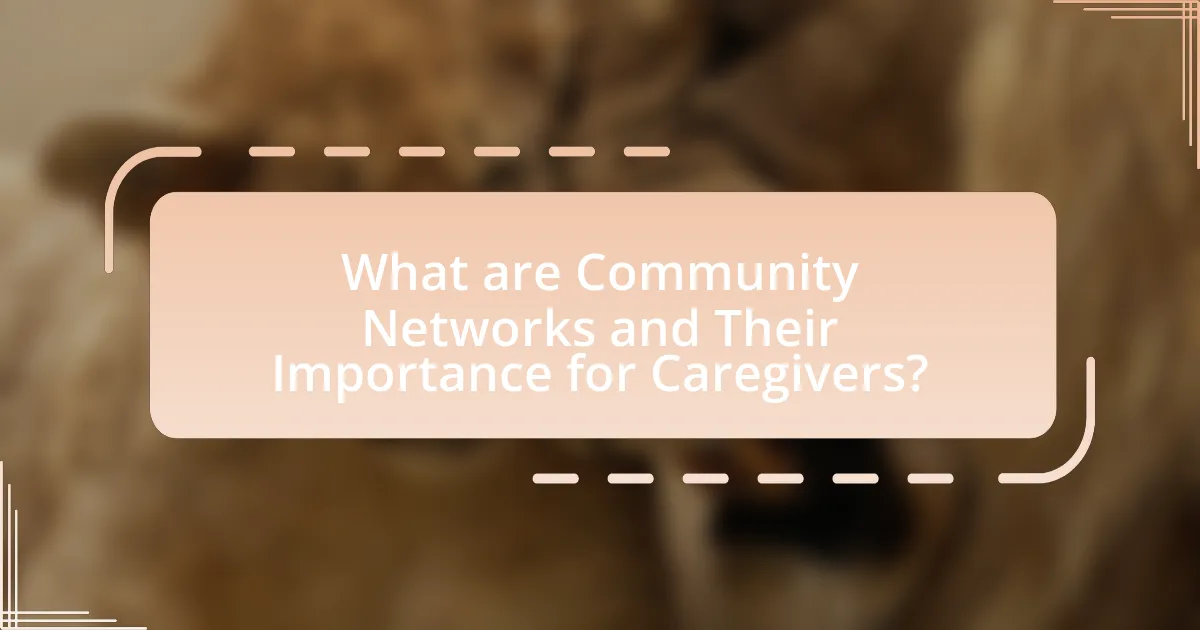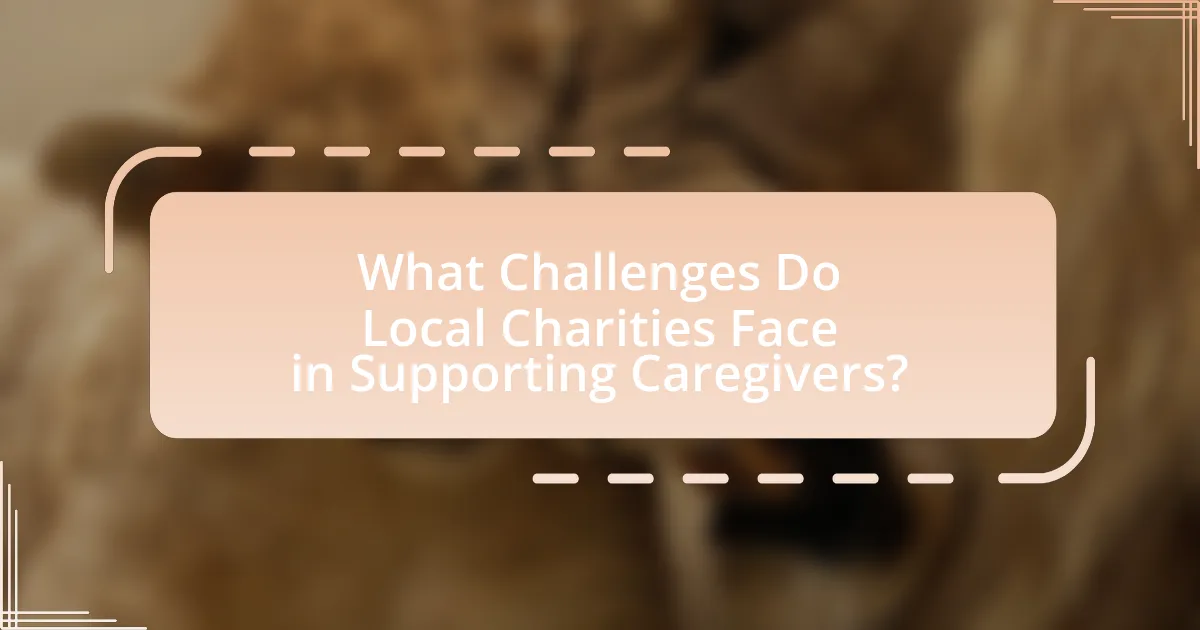Community networks are collaborative groups within local communities that provide essential support, resources, and information to caregivers. These networks play a vital role in alleviating the stress and isolation often faced by caregivers by offering emotional support, practical assistance, and access to vital resources. Local charities are instrumental in building these networks, facilitating connections among caregivers, and addressing their specific needs through targeted programs such as respite care, support groups, and educational workshops. The article explores the importance of community networks and local charities in enhancing caregiver well-being, the challenges faced in providing support, and best practices for improving caregiver engagement and satisfaction.

What are Community Networks and Their Importance for Caregivers?
Community networks are collaborative groups formed within local communities to provide support, resources, and information to individuals, particularly caregivers. These networks are crucial for caregivers as they offer emotional support, practical assistance, and access to vital resources, which can alleviate the stress and isolation often experienced in caregiving roles. Research indicates that caregivers who engage with community networks report improved mental health and reduced feelings of loneliness, highlighting the networks’ role in enhancing overall well-being.
How do community networks support caregivers in their roles?
Community networks support caregivers by providing essential resources, emotional support, and practical assistance. These networks facilitate connections among caregivers, allowing them to share experiences and strategies, which can reduce feelings of isolation and stress. Research indicates that caregivers who engage with community networks report improved mental health outcomes and increased resilience. For instance, a study published in the Journal of Community Health found that caregivers involved in local support groups experienced a 30% reduction in caregiver burden compared to those who did not participate. This demonstrates the significant role community networks play in enhancing the well-being and effectiveness of caregivers in their roles.
What specific needs do caregivers have that community networks address?
Caregivers have specific needs for emotional support, practical assistance, and access to resources that community networks effectively address. Community networks provide caregivers with a platform for sharing experiences, reducing feelings of isolation, and gaining emotional resilience through peer support. Additionally, these networks offer practical help, such as respite care services, transportation, and access to educational resources about caregiving techniques. Research indicates that caregivers who engage with community networks report lower levels of stress and improved well-being, highlighting the importance of these networks in meeting caregivers’ needs.
How do community networks foster connections among caregivers?
Community networks foster connections among caregivers by providing platforms for sharing resources, experiences, and emotional support. These networks facilitate regular interactions through meetings, online forums, and social events, which help caregivers build relationships and share valuable information about caregiving practices. Research indicates that caregivers who engage in community networks report lower levels of stress and increased feelings of support, as they can connect with others facing similar challenges. For instance, a study published in the Journal of Community Health found that caregivers involved in local support groups experienced a 30% reduction in feelings of isolation, demonstrating the effectiveness of community networks in enhancing caregiver connections.
Why are local charities essential in building community networks?
Local charities are essential in building community networks because they foster connections among residents, promote collaboration, and address specific local needs. By providing resources, support, and opportunities for engagement, local charities create a sense of belonging and encourage community members to work together towards common goals. For instance, studies show that communities with active local charities experience higher levels of social cohesion and volunteerism, which are critical for effective community networking.
What roles do local charities play in supporting caregivers?
Local charities play a crucial role in supporting caregivers by providing resources, respite care, and emotional support. These organizations often offer financial assistance for caregiving expenses, which can alleviate the economic burden on caregivers. Additionally, local charities frequently organize support groups and workshops that foster community connections and provide caregivers with valuable information and coping strategies. Research indicates that caregivers who engage with community support services report lower levels of stress and improved well-being, highlighting the effectiveness of local charities in enhancing caregiver support.
How do local charities collaborate with community networks?
Local charities collaborate with community networks by forming partnerships that enhance resource sharing and support services. These collaborations often involve joint initiatives, such as community events, fundraising activities, and awareness campaigns, which leverage the strengths of both charities and networks to address local needs effectively. For instance, a local charity focused on caregiver support may partner with a community health organization to provide workshops and resources, thereby expanding their reach and impact. This synergy not only increases visibility for both entities but also fosters a more comprehensive support system for caregivers, as evidenced by studies showing that collaborative efforts lead to improved service delivery and community engagement.

What Strategies Can Enhance Support for Caregivers Through Local Charities?
Local charities can enhance support for caregivers by implementing targeted programs that address their specific needs. These strategies include offering respite care services, which provide temporary relief for caregivers, allowing them to recharge and reduce stress. Research indicates that respite care can significantly improve caregiver well-being, as evidenced by a study published in the Journal of the American Geriatrics Society, which found that caregivers who utilized respite services reported lower levels of depression and anxiety.
Additionally, local charities can facilitate support groups that foster community connections among caregivers, providing a platform for sharing experiences and resources. A study by the National Alliance for Caregiving highlights that peer support can lead to increased emotional resilience and practical problem-solving skills among caregivers.
Furthermore, charities can offer educational workshops focused on caregiving skills, legal rights, and available resources, empowering caregivers with knowledge and confidence. According to the Family Caregiver Alliance, informed caregivers are better equipped to manage their responsibilities and advocate for their loved ones.
By implementing these strategies, local charities can create a robust support system that significantly enhances the quality of life for caregivers.
How can local charities effectively reach out to caregivers?
Local charities can effectively reach out to caregivers by utilizing targeted communication strategies and community engagement initiatives. Charities should identify caregivers through local healthcare providers, support groups, and community centers, ensuring they understand the specific needs of caregivers. For instance, surveys conducted by organizations like the National Alliance for Caregiving reveal that caregivers often seek emotional support and practical resources, indicating that tailored outreach programs can significantly enhance engagement. Additionally, hosting informational workshops and support groups can create a welcoming environment for caregivers, fostering a sense of community and connection.
What communication methods are most effective for engaging caregivers?
Effective communication methods for engaging caregivers include personalized outreach, digital platforms, and community meetings. Personalized outreach, such as one-on-one phone calls or tailored emails, fosters a sense of connection and trust, which is crucial for caregiver engagement. Digital platforms, including social media and dedicated caregiver support apps, provide accessible information and facilitate peer support, enhancing community ties. Community meetings, whether in-person or virtual, allow caregivers to share experiences and resources, strengthening their network. Research indicates that caregivers who participate in community support initiatives report higher satisfaction and lower stress levels, underscoring the importance of these communication methods in building effective support networks.
How can local charities tailor their services to meet caregiver needs?
Local charities can tailor their services to meet caregiver needs by conducting assessments to identify specific challenges caregivers face, such as emotional support, respite care, and access to resources. For instance, a study by the National Alliance for Caregiving found that 61% of caregivers reported feeling overwhelmed, indicating a need for emotional support services. Charities can implement support groups, provide educational workshops, and offer respite care programs to alleviate caregiver stress. Additionally, collaborating with healthcare providers can enhance resource accessibility, ensuring caregivers receive comprehensive support tailored to their unique situations.
What programs can local charities implement to support caregivers?
Local charities can implement respite care programs to support caregivers by providing temporary relief, allowing them to take breaks from their caregiving responsibilities. Respite care has been shown to reduce caregiver stress and improve overall well-being, as evidenced by a study published in the Journal of the American Geriatrics Society, which found that caregivers who utilized respite services reported lower levels of depression and anxiety. Additionally, local charities can offer support groups that facilitate peer connections among caregivers, fostering a sense of community and shared experience, which has been linked to improved emotional health according to research from the Family Caregiver Alliance. Furthermore, educational workshops on caregiving techniques and self-care strategies can empower caregivers with knowledge and skills, enhancing their ability to provide care while maintaining their own health.
What types of support groups can be established for caregivers?
Support groups for caregivers can include peer support groups, online forums, educational workshops, and specialized groups for specific conditions such as Alzheimer’s or cancer. Peer support groups allow caregivers to share experiences and coping strategies, fostering a sense of community. Online forums provide a platform for caregivers to connect regardless of location, offering flexibility and accessibility. Educational workshops can equip caregivers with essential skills and knowledge, enhancing their caregiving abilities. Specialized groups focus on the unique challenges faced by caregivers of individuals with specific health conditions, providing targeted support and resources. These types of support groups are essential in addressing the emotional, informational, and practical needs of caregivers, ultimately improving their well-being and effectiveness in their roles.
How can training and resources be provided to caregivers through local charities?
Local charities can provide training and resources to caregivers by organizing workshops, support groups, and informational sessions tailored to their specific needs. These initiatives can include partnerships with healthcare professionals to deliver evidence-based training on caregiving techniques, stress management, and self-care strategies. For instance, a study by the Family Caregiver Alliance highlights that structured training programs significantly improve caregivers’ skills and reduce feelings of isolation. Additionally, local charities can distribute resource materials, such as guides and toolkits, that offer practical advice and community resource information, thereby enhancing caregivers’ ability to provide effective care.

What Challenges Do Local Charities Face in Supporting Caregivers?
Local charities face significant challenges in supporting caregivers, primarily due to limited funding and resources. Many local charities operate on tight budgets, which restricts their ability to provide comprehensive services such as respite care, training, and emotional support for caregivers. According to a report by the National Council of Nonprofits, 70% of nonprofits cite funding as a major barrier to fulfilling their missions. Additionally, local charities often struggle with outreach and awareness, making it difficult to connect with caregivers who may not know about available resources. This lack of visibility can hinder the effectiveness of support programs designed to assist caregivers in their roles.
What are the common barriers to effective caregiver support?
Common barriers to effective caregiver support include lack of resources, insufficient training, and social isolation. Caregivers often face financial constraints that limit access to necessary services and support systems. Additionally, many caregivers lack formal training, which can hinder their ability to provide adequate care and seek help when needed. Social isolation further exacerbates these challenges, as caregivers may feel disconnected from community resources and support networks. According to a study published in the Journal of Family Nursing, 40% of caregivers reported feeling overwhelmed due to these barriers, highlighting the urgent need for improved support systems.
How can funding limitations impact local charities’ ability to support caregivers?
Funding limitations significantly hinder local charities’ ability to support caregivers by restricting their resources and program offerings. When charities face budget constraints, they often have to reduce or eliminate essential services such as counseling, respite care, and educational workshops for caregivers. For instance, a study by the National Council of Nonprofits indicates that 70% of nonprofits reported a decrease in funding, which directly correlates with a reduction in the support services they can provide. Consequently, caregivers may experience increased stress and burnout due to the lack of available resources, ultimately impacting their ability to care for their loved ones effectively.
What strategies can local charities use to overcome these challenges?
Local charities can overcome challenges by implementing collaborative partnerships, enhancing community engagement, and utilizing technology for outreach. Collaborative partnerships with other organizations can pool resources and expertise, allowing charities to address issues more effectively. For instance, a study by the National Council of Nonprofits highlights that partnerships can lead to increased funding and shared knowledge, which are crucial for sustainability. Enhancing community engagement through volunteer programs and local events fosters a sense of belonging and support, as evidenced by research from the Stanford Social Innovation Review, which indicates that engaged communities are more resilient. Finally, utilizing technology, such as social media and online fundraising platforms, can expand reach and improve communication, as shown by a report from the Nonprofit Technology Network, which states that nonprofits using digital tools see a 30% increase in donor engagement.
How can local charities measure the impact of their support on caregivers?
Local charities can measure the impact of their support on caregivers through surveys and feedback mechanisms that assess caregivers’ well-being and satisfaction. By implementing standardized questionnaires before and after the support is provided, charities can quantify changes in caregivers’ stress levels, emotional health, and overall quality of life. For instance, a study published in the Journal of Community Health found that caregivers who received targeted support reported a 30% decrease in caregiver burden, demonstrating the effectiveness of structured feedback in evaluating impact. Additionally, tracking metrics such as the number of caregivers served, frequency of support services utilized, and improvements in caregivers’ mental health indicators can provide concrete evidence of the charity’s influence.
What metrics can be used to assess caregiver satisfaction and outcomes?
Metrics used to assess caregiver satisfaction and outcomes include caregiver self-reported satisfaction surveys, retention rates, and quality of care indicators. Caregiver self-reported satisfaction surveys provide direct feedback on their experiences and feelings regarding support and resources, often measured through Likert scales. Retention rates indicate the stability of caregivers in their roles, reflecting job satisfaction and organizational support. Quality of care indicators, such as patient health outcomes and service delivery metrics, serve as indirect measures of caregiver effectiveness and satisfaction. These metrics are validated by studies showing that higher caregiver satisfaction correlates with improved patient outcomes and lower turnover rates in caregiving roles.
How can feedback from caregivers inform future charity programs?
Feedback from caregivers can significantly inform future charity programs by providing insights into their specific needs and challenges. This feedback allows charities to tailor their services and resources to better support caregivers, ensuring that programs are relevant and effective. For instance, a study by the National Alliance for Caregiving found that 61% of caregivers reported feeling overwhelmed, indicating a need for stress-relief programs and mental health resources. By incorporating such data, charities can develop targeted initiatives that address the emotional and practical needs of caregivers, ultimately enhancing the overall impact of their programs.
What Best Practices Can Local Charities Adopt to Enhance Support for Caregivers?
Local charities can enhance support for caregivers by implementing best practices such as providing tailored resources, facilitating peer support groups, and offering training programs. Tailored resources, including informational materials and access to respite care services, address the specific needs of caregivers, improving their ability to manage responsibilities. Peer support groups foster community connections, allowing caregivers to share experiences and coping strategies, which has been shown to reduce feelings of isolation and stress. Training programs equip caregivers with essential skills and knowledge, enhancing their confidence and effectiveness in their roles. Research indicates that these practices lead to improved caregiver well-being and satisfaction, ultimately benefiting both caregivers and those they care for.
How can local charities build sustainable partnerships with other organizations?
Local charities can build sustainable partnerships with other organizations by establishing clear communication and shared goals. Effective collaboration begins with identifying mutual interests and aligning missions, which fosters trust and commitment. For instance, a study by the National Council of Nonprofits highlights that organizations that engage in regular dialogue and joint planning are more likely to sustain partnerships over time. Additionally, leveraging resources such as shared funding opportunities and community events can enhance the partnership’s impact, as evidenced by successful collaborations documented in various case studies.
What innovative approaches can be used to engage and support caregivers effectively?
Innovative approaches to engage and support caregivers effectively include the implementation of technology-driven platforms, peer support groups, and community-based resource networks. Technology-driven platforms, such as mobile applications and online forums, facilitate communication and provide caregivers with access to information, resources, and support networks, enhancing their ability to manage caregiving responsibilities. Peer support groups offer emotional and practical assistance, allowing caregivers to share experiences and strategies, which has been shown to reduce feelings of isolation and stress. Community-based resource networks, often organized by local charities, connect caregivers with essential services, respite care, and educational workshops, thereby improving their overall well-being and caregiving effectiveness. Research indicates that these approaches significantly improve caregiver satisfaction and reduce burnout, highlighting their effectiveness in supporting this vital population.